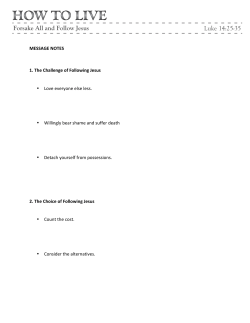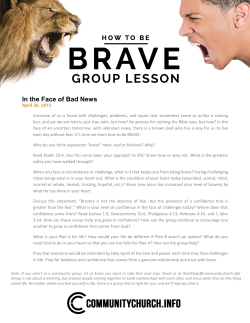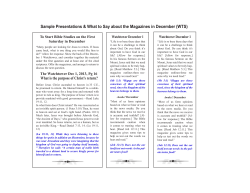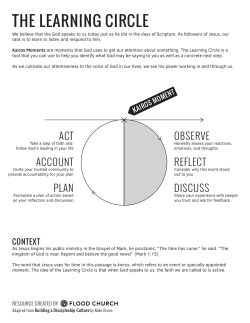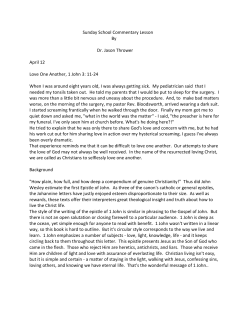
find out more about seminars
Seminars: "Thank you for your contribution to a good understanding of the relationship between psychology and spirituality." Claudio Consuegra, Family Ministries Director, North American Division of the Seventh-day Adventist Church "Energetic, enthusiastic, and deeply spiritual -- that's Jennifer Jill Schwirzer. Drawn from her personal study into Scripture, her message will fill you with the assurance of God's unfathomable love for you. Grab the opportunity to sit at the feet of Jesus!" Audie Silber, Director, Northern California Christian Women's Retreat "Jennifer is a dynamic speaker that draws people in. She balances biblical truth with medical science and personal experience. There is never a dull moment with her great sense of humor and music. It is obvious she is passionate about Jesus and wants to share her passion with others." Diana Lamar, Women's Ministry Director, Illinois "Thank you for your spirited, uplifting, motivating and liberating presentations!" The Women's Ministry of Hampton Roads/Tidewater Virginia Finding Peace: Lasting change though Biblical psychology This four-part seminar uses the Bible as its chief source to explore the subject of mental and emotional healing. The message of the gospel has been called the "message of His healing grace"; it is the source of true recovery from all that ails. The seminar isn't a cliche-driven, surface treatment of the subject, but rather a careful analysis of the human condition and God's method of change. Some of the topics include: 1. Assessing the Damage -- The first step toward healing is proper diagnosis. Spiritually, we must gain an understanding of the human condition. Genesis chapter three is the basis for this. It is there that we where our alienation, misapprehension, guilt, shame, denial, self-righteousness, blame, animosity and fear came from. 2. People Change -- This Is How -- Many despair of overcoming deep-seated tendencies toward destructive thought and behavior. Addictions and compulsions abound, even in Christian circles. But when Jesus said He would save us, it was from more than the penalty of sin. It was from its power and dominance in our lives. 3. Case Study Number One -- Psychological theories must ultimately be validated by evidence. One of the most common methods of testing is a "case study," in which an individual subjected to the variable in question is observed. Mary Magdalene was just such a case study. Her miraculous recovery from demon possession and mental illness marked Jesus' simple method as 100 percent effective. 4. A "Me" Replacement -- Self-concept is a powerful determinant of behavior. God's answer to our identity crisis is to make us new creatures in Christ. This ability to see ourselves as God sees us is key to overcoming long-standing cycles of defeat. 5. Hope for Sad, Anxious People -- In our "prosperous" culture, mood disorders are epidemic. Yet God's will is that our souls prosper. While attempting to change our emotions is like trying to catch the wind, it is possible to change our thoughts. Careful management of the thought life leads to lifted mood and often the resolution of serious psychological disorders. To Love and Be Loved: Forming relationships with God and people for now and forever. To Love and Be Loved: Forming relationships with God and people for now and forever. 1. Broken Is Good -- All of us know the sting of relationship failure. God turns the curse of our foiled attempts at love into the blessing of a discovery of a deeper love found in Him. From that place of healing He calls us to love again. This talk will provide hope for the discouraged and establish a biblical basis for science of relationship. 2. The Family, Love's Bootcamp -- At the outset of the life cycle God places us with caregivers and siblings who provide many opportunities to develop our bonding skills. Often misfortune and sin disrupt God's design for families; yet He provides constant opportunities to recover and learn the precious lessons of love. This talk will explain the basics of human bonding and provide practical steps for ensuring it. 3. Friendship, Love, Sex and Marriage -- Shortly into the life cycle, we launch out from our homes of origin and begin to form relationships of our own. For some this phase of life will include the formation of a marriage. In the hands of the Designer, human sexuality, so fraught with dangers, reveals His self-giving love. This talk will explore the topic of human sexuality from a biblical perspective. 4. Abuse Stops Here -- The home which God created to be a refuge from danger, sometimes becomes dangerous because of physical, sexual, emotional, verbal or other kinds of abuse. This talk will enable us to understand the impact of abuse and how to overcome and replace the unhealthy patterns of coping we often develop. 5. The Church of If-All-Else-Fails -- The body, the bride, the family, the flock—the Bible uses many a metaphor for the church. Among all its other functions, it is a school where we learn how to love and be loved. For those who have never formed healthy relationships, it provides and opportunity to form those attachments. This talk will provide a picture of God's design for the church, plus give practical steps for developing a healthy connection to it. The Way of the Ragged Heart: An honest, hopefully helpful, marriage seminar God's first purpose in marriage is holiness; happiness is a by-product. Through our most intimate relationships, we learn to love the way Jesus loves; through trials and struggles we become like Him. But have you noticed that striving to make our marriages and spouses better often makes them worse? This seminar helps those who have tried and failed to "fix" their marriages. It presents the simple, brilliant idea of learning to love in the midst of, and in spite of, brokenness and failure. 1. God = Love = Giving -- The foundations of human love rests in the triune "family" of the Godhead--the Father, Son, and Spirit, perfectly, yet unselfishly, bonded. Beholding this love, and how it was interrupted at the Cross, furnishes powerful motivation to incorporate agape into our own relationships. 2. God's "Voila!" -- We were made in the image of God, His crowing act of creation, male and female. Marriage presents a perfect opportunity for the blending necessary to represent the character of God. Gender differences should be neither exaggerated or ignored. What did God have in mind when he made man and woman? 4. The Snack that Changed the World -- Sin brought radical changes to both our individual natures and our relationships. According to Genesis three, women suffer for children, crave their partner's approval, and are subject to them. Men struggle for survival, but die anyway. Can the Edenic state, specifically God's ideal of equality and teamwork, be regained? 5. Communication Mediates Love -- Learn how to communicate well, and how to avoid the pitfalls all too common. This component of the seminar moves from theology to praxis, answering the question, "How does God's love look in action?" 6. Listen First, Argue Less -- Learn how to argue fairly, effectively and with the final product of working through and resolving conflict. Learn the uncommon skill of listening well, and how this can create an environment within the relationship of mutual understanding. The Lamb Wins: A story of love and war from the book of Revelation This seminar journeys through the book of Revelation with a special focus on the Lamb, Jesus Christ. Jennifer will share many well-known truths with special attention to the righteousness and unfailing love of God as revealed in the end time prophecies. 1. Love is Power -- The great controversy is won, not through the love of power but through the power of love. Through Jesus' servant leadership the heart of His stubborn, willful bride will be won at last. Once He has won her heart heart, He will easily vanquish the enemy. This talk will set the tone and establish a Lamb-centered theme for the study of Revelation. 2. The Heartbreak of the Little Book -- Our denominational history began with a theological mistake. God sometimes uses our mistakes better than our triumphs. Through the drama of the little book, He raised up a people to follow the Lamb through the sanctuary, straight into the Most Holy Place, the heart of God. This talk will strengthen our connection to the sanctuary message, and assist us in grasping a love-based rather than fear-based approach to it. 3. Choose Your Beast -- In the prophecies of the beast and its image we see the rise of a tyranny that will rob us of our freedoms. God will respond with a warning of His own called the three angels message. Love and selfishness, force and freedom will come face to face—and each one of us will choose which beast we will follow. This talk will put in accessible terms the end-time conflict and equip saints to find their security in Jesus. 4. Goodbye, Madame Babylon -- After millennia of martyrs' cries of "How long?" the scenes of the final judgment will unfold. Once each person has made his or her choice, probation will have lost its purpose. Babylon and the kings of the earth, along with the beast and its image, will be consumed in the lake of fire. Divine justice is an act of love, even to the ones who receive it. This talk will explore the theme of the judgment in such a way as to diffuse irrational fear and better understand the character of a God of love. 5. The Wedding -- Once the smoke from the final destruction clears, those who love and worship the Lamb will corporately unite with Him in a wedding to end all weddings. Thereafter we will inhabit a New Earth from which every trace of evil and selfishness has been removed. This talk will reveal the love of God as manifest in the final chapters of the Bible as we see all that He has planned for us. WOW! The Word on Women: Scripture, science and story on the creation and fall of womankind, her tragic suffering, and her deliverance in Christ Humanitarians wrestle with the oppression of women, calling it the "central moral challenge of our time." Why are one in three women globally either beaten, raped or coerced into sex? God pronounced a curse in Eden, but the lot of womankind reflects something much more severe than God had in mind. Lurking behind the scenes, ever trying to project his own character onto God, an enemy works to tear women down from their lofty calling in Christ. Fortunately, the Redeemer works more mightily to elevate woman back to her original state of equality and excellence. 1. Girl, Created -- What did God have in mind when He created woman? What are some of the key differences between the genders? This talk is a playful and interesting exploration into the Genesis account. 2. Prodigal Daughter -- The fall of humanity brought curses for the respective genders. What did God have in mind when He spoke the curse upon womankind? This talk discovers the benevolent purpose of God, even in the curse itself, to elevate women back to her original place. 3. Rachel Weeping -- The enemy of womankind took God's curse and construed it into something much more severe and devastating than God ever intended—and then cast the blame back upon God! This talk helps us separate God's will from the enemy's perversion, thus endearing women back to the One whose purposes for them are good and not evil. 4. "Damsel, Arise!"-- What can we do on a practical level that will help women realize their full potential? This talk presents action steps that take women beyond the realm of theory into practical application of the principles of the gospel. Pure Love: A purity seminar for young people "Pure Love" is a presentation that designed to instill moral principles in young hearts. It can be adapted to the needs of the academy or youth group into a program ranging from a one-talk session to an extended week of prayer. Teens are increasingly sexually active before marriage. For instance, since 1970, the rate of adolescent girls losing their virginity has jumped from 5 percent to over 30 percent. Thankfully, the "True Love Waits" movement has succeeded in increasing the number of virgin teens through raising awareness of the effects of casual sex. But while we applaud any effort to stem the tide of immorality in our world, we recognize that no lasting motivation to remain sexually pure exists apart from the gospel. "Pure Love" is an attempt to put the issue of moral purity in the context of the gospel of Jesus Christ and make a spiritual appeal which we hope will result in moral reform. The "Why, God?" Questions: All the things you wanted to know about God but were afraid to ask This four-part series addresses the things about God that don't make sense. These gut-wrenching issues can only be resolved in the light of God's love which streams from the cross. There we see the perfect blend of justice and mercy which comprises God's love.The four meetings are, as follows: 1. Why Punishment? -- Not a few have been perplexed by the passages that seem to depict a punitive God. These passages are compared with others that illuminate the Godhead's true motives and purposes behind retributive justice. 2. Why Suffering? -- Millions are bowed down with grief, hardly able to bear the burden of everyday living because of physical disease, loss and catastrophe. Why does God allow such pain? This study draws back the veil and shows the blessed side of human suffering. 3. Why Injustice? -- This is a broader question still than punishment or suffering, because it not only involves God allowing the unjust to go unpunished, but the just to suffer. There is, however, a lesson for us in the experience of injustice, as well as the knowledge that God's forbearance is the foundation upon which we exist. 4. Why Me? -- Perhaps the hardest aspect of the "Job experience" is the feeling that for some reason the hurting one has been singled out by God as deserving condemnation. This study explores some of the feelings associated with serious misfortune and presents hope to the despairing that God is, in fact, suffering right alongside them. From the Garden to the Cross: Walk with Jesus through the last hours of His life This four-part series is a journey through the last twelve hours of Jesus' life. Should we, as His loved ones, not long to relive those moments with Him as anyone whose loved one dies? This seminar carefully reports the facts as they are recorded in the scriptures, and then explores the ramifications of each event. The four meetings are, as follows: 1. The Orphan -- As the cloud of heaven's condemnation of sin wrapped itself about Jesus, He cried out to His Father. Yet there was seeming silence where there had been only joyful communion. In a world full of fatherless children, Jesus became a fatherless child for us. 2. The Heretic -- During His trials before Annas, Caiaphas and the Sanhedrin, Jesus was condemned three times by His church. To be rejected by one's faith community is a devastating experience. Jesus endured the manipulative malice of the Pharisees and Saducees with serene patience. He even took bravely the blow of Peter's denial. From Him we learn how to respond to hypocrisy and toxic religion, and how to win those who will be won. 3. The Convict -- The Jews could not crucify Jesus without a ratification from Rome. Because of Jesus' innocent demeanor, Pilate mightily resisted the pressure to condemn Jesus to crucifixion. Herod, although a hardened man, also feared to condemn One so innocent. Ultimately, Pilate's love of position drove him to do what he knew was wrong. Through Jesus' conversations with Pilate, we gain a deep understanding of how He dealt with the secular mind, and how to graciously appeal to the hearts of proud people. 4. The Anathema -- Crucifixion was, to the Jewish mind, a sign of utter God-abandonment. In a strange transfer of sin and righteousness, God Himself became God forsaken in Jesus Christ. In these closing scenes of Jesus' life, we see the Great Controversy between Christ and Satan come to a climax. This will prepare us for a replay of these same dynamics in the closing scenes of earth's history. Living Parables: How God paints His portrait in ordinary lives God communicates to different minds in varied ways through His Word. There is the beautiful poetry of the Psalms, the logic of Paul, the mathmatical exactitude of the prophecies. The most universally appealing and accessible form of communication, however, is the story. The amazing thing about the stories of the Bible is that they are true on more than one level. First, they are actual accounts of the lives of real people. Secondly, they are often beautiful tapestries of the great truths of redemption. Average human beings like you and me, in living out their lives, painted a picture of something much greater than themselves. They were not aware that the simple unfolding of events would be such a vital instrument of instruction to us. 1. Mephibosheth: Dead Dog, Royal Son -- This disabled man's life speaks volumes to us today on the issues of self-worth and significance. 2. Job: The Innocent Sufferer -- This well-known man was used of God to illustrate some pensive questions that come in the face of tragedy. 3. Mary Magdalene: The Broken Woman and Her Broken Box -- Who was Jesus' primetime disciple? This woman, as far as He was concerned. Learn from her that forgiveness is the key to reflecting the love of Jesus to others.
© Copyright 2025




